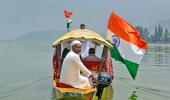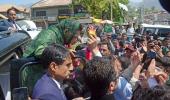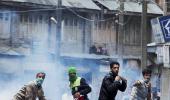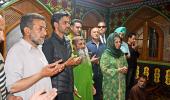'There is no link between Article 370 abrogation and a rise in voting percentage.'

The only thing straight in Kashmir is the poplar tree.
This quote from then national security advisor Brajesh Mishra is often invoked to describe the complex and tumultuous political situation in the Valley. Kashmir is again in the news. Though, this time, not for its political unrest, but for its high voter turnout in the Lok Sabha polls.
Srinagar and Baramulla constituencies, known for their abysmally low vote count, for the first time in decades saw a turnout of 38.49 per cent and 59.10 per cent, respectively.
Sopore in Baramulla district, which has seen incidents of separatist activity, recorded over 44 per cent voting.
In South Kashmir's Pulwama and Shopian districts, where militant groups have long held sway, over 43 per cent and 47 per cent voting took place, a significant jump from just one per cent and above two per cent, respectively, in the 2019 general elections.
After Srinagar and Baramulla, all eyes are now on the Anantnag-Rajouri seat, which goes to the polls today, May 25.
Spread across the Pir Panjal range, the redrawn constituency after the delimitation process is where the Bharatiya Janata Party hopes for a win for the candidate it is supporting, the Apni Party's Zafar Iqbal Manhas. He is up against the People's Democratic Party's Mehbooba Mufti and the National Conference's Mian Altaf.
The Valley, where poll boycott calls from militant groups and separatists used to be the order of the day, has seen high decibel campaigning and is abuzz with election razzmatazz.
Unlike in the past when people were averse to being seen queuing up outside polling booths, they came out in droves, with many flashing their inked fingers after casting their votes.
Kashmir's rising poll participation also assumes significance because it came two days after a militant attack in Pahalgam killed a former sarpanch of the BJP and also injured two tourists.
It is the first major election held in Kashmir after the Centre scrapped J&K's special status and downgraded the erstwhile state into two Union territories of J&K and Ladakh.
The remarkable departure from the past has elicited mixed responses.

Home Minister Amit Shah credited the abrogation of Article 370 for the higher voter percentage, asserting that it was a 'befitting reply' to those who ask what had changed after the Centre's move in August 2019.
Union Minister Jitendra Singh said the rising voter turnout indicated 'declining dynasty politics in Kashmir'.
The political parties in Kashmir had a different response to the spike in voting patterns. Waheed ur Rehman Para, the PDP candidate from the Srinagar Lok Sabha constituency, told Business Standard that the high voter turnout was not so much a reaction against the Centre's scrapping of Article 370 but people's growing 'faith in democracy' and their wish to fill a 'political vacuum' in the Valley.
"It indicates democratic renewal and reflects people's desire to look for solutions through democracy. A realisation that democratic ways are more tangible to put across grievances," he said .
J&K People's Conference, a major player in Baramulla, attributed the rise to the absence of boycott calls and shrinking political space.
"There is no link between Article 370 abrogation and a rise in voting percentage. More people would have stayed away from polling booths if it were about the scrapping of Article 370. It's a vote for change and vote against non-deliverance," party spokesperson Adnan Ashraf Mir told Business Standard.
"It's also because parliamentary polls have now attained great significance. Earlier, sending someone to Parliament was seen as a punishment. But after the August 5 decision, when there was no assembly left and people suddenly realised the importance of Parliament. It's become the only important forum to represent the people's concerns," he said.
Speaking to reporters in Srinagar,National Conference Vice-President Omar Abdullah said: "If they want to link it to Article 370 (abrogation), they will have to answer why the turnout was higher in the elections held before 1990. He attributed the rise in voter turnout partly to people's anger against the abrogation of Article 370.
"The second reason is that they (people) are not heard at any level. The present dispensation is ruling like undisputed kings," he said.

Anantnag-Rajouri contest
The BJP is not fighting the polls in Kashmir and is not formally aligned with any regional party. However, it is supporting what the party's local leaders call 'like-minded parties'.
The BJP government recently gave Scheduled Tribe status to the Pahari community to woo the voters, who form a major chunk of the electorate in the newly carved Anantnag-Rajouri constituency. The reservation, however, has sharpened the ethnic divide between the Gujjar-Bakarwal and Pahari communities. It has also made the three way contest more interesting.
It's difficult to predict whether the move will pay electoral dividends to the BJP, or will the rift between the two communities eventually help the PDP increase its vote share.
Predictions about Kashmir's politics generally come a cropper. After all, the only thing straight in Kashmir is the poplar tree.












 © 2025
© 2025